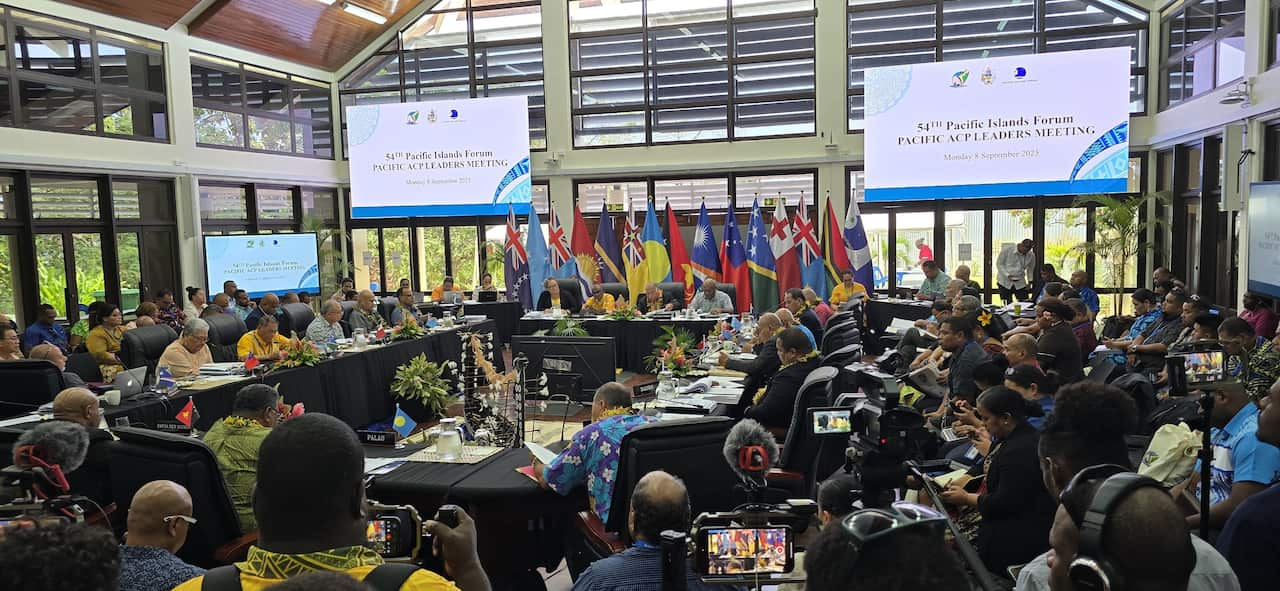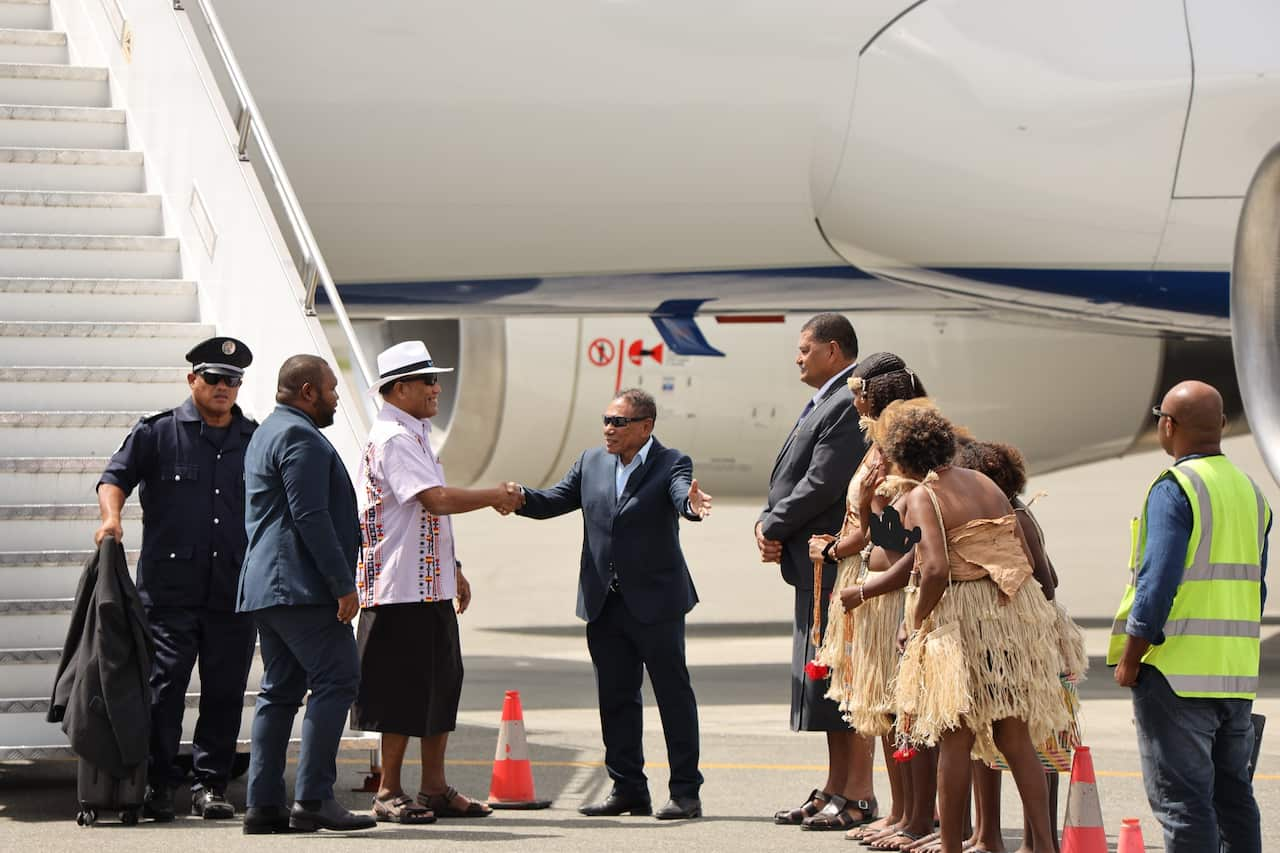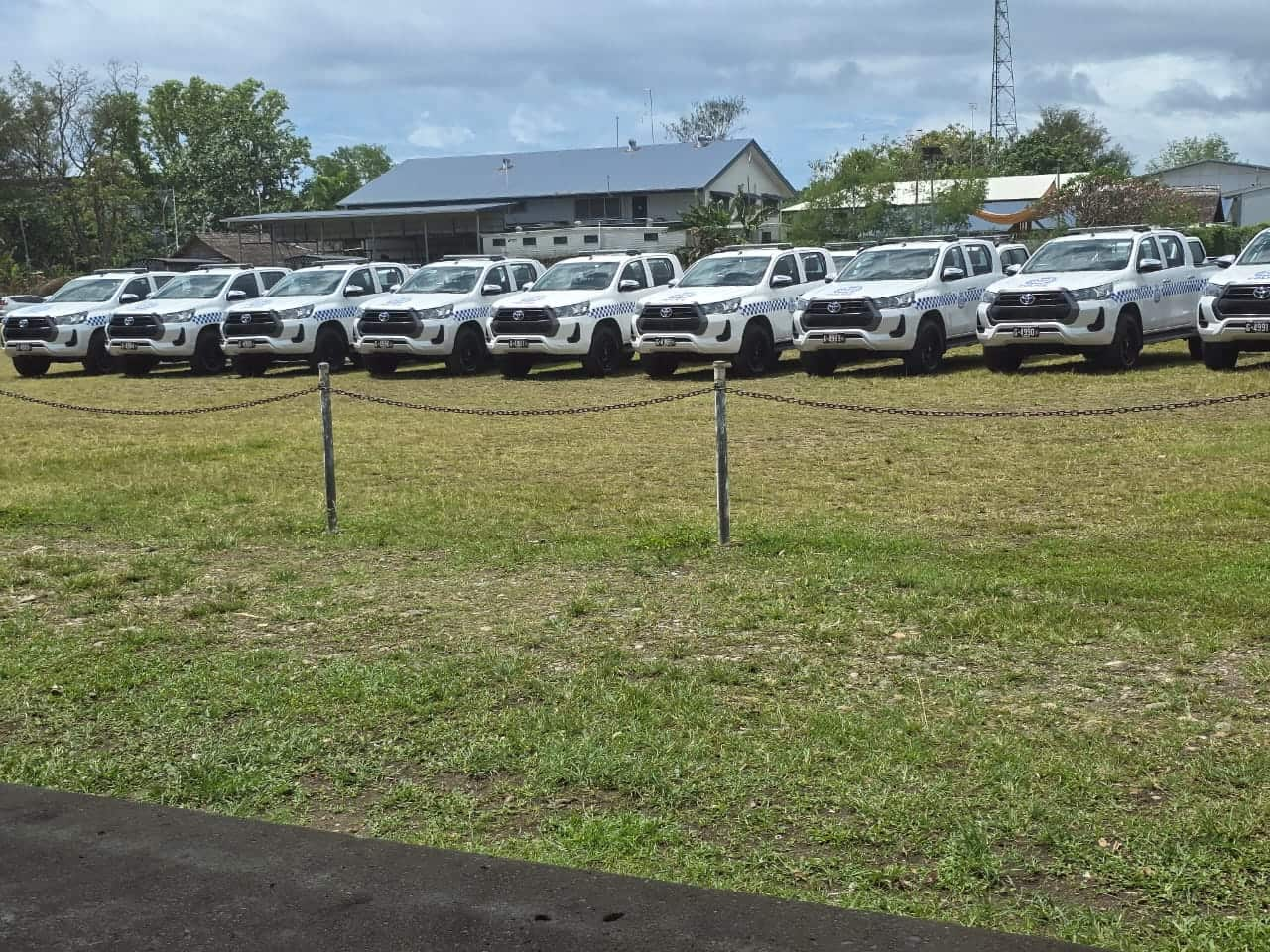Prime Minister Anthony Albanese will soon arrive in Solomon Islands' capital, Honiara, to attend a regional summit that has become a point of tension between China, Taiwan, and Australia.
The annual Pacific Islands Forum (PIF) counts Australia among its 18 member states and is also usually attended by its non-member 'dialogue partners', which include China, the United States, India, Japan and others.
But this year the event is members-only, although Solomon Islands Prime Minister Jeremiah Manele has said a meeting with dialogue partners will be held at a later date.
'A bit of a walk back'
The Lowy Institute's Pacific Islands Program director, Mihai Sora, said the members-only decision started with Solomon Islands' announcement that it would exclude Taiwan.
Taiwan isn't an an official PIF dialogue partner but has been part of the international delegation at PIF meetings for several decades.
"When Solomon Islands telegraphed that they intended to exclude Taiwan from this meeting, some Pacific leaders, as well as Australia and New Zealand, criticised the move," said Sora, a former Australian diplomat who previously served in Solomon Islands.
"For a few Pacific countries, in fact, they threatened to boycott the meeting altogether," he said.
"Solomon Islands' decision to exclude all dialogue partners is a bit of a walk back from that ... the main objective is to exclude Taiwan."
When announcing in August that dialogue partners would not be invited, Manele said this was because a review of each country's relationship with the Pacific had not been completed.
Some Pacific leaders said Solomon Islands made the decision after pressure from China. Wang Xiaolong, China's ambassador to New Zealand, denied this, but said Taiwan "does not belong" at the meeting.
China claims democratically governed Taiwan as its own territory and has not renounced the use of force to bring he island under its control. Taiwan strongly objects to the sovereignty claims and says only the island's people can decide their future.

Solomon Islands ended 36 years of diplomatic relations with Taiwan and switched allegiance to China in 2019, signing a security pact with China in 2022 that raised Australia's ire.
"Solomon Islands' government thought that it would be more palatable to members if they could say that they're excluding all dialogue partners, and the reason being that it would allow Pacific leaders more bandwidth, more airtime to focus on their own issues rather than having to service international commitments in the same week," Sora said.
Former PIF governance and engagement director Sione Tekiteki expressed similar sentiments, saying the decision to exclude all countries was primarily aimed at avoiding tensions between Pacific countries affiliated with China and those affiliated with Taiwan.
"If they invited China and not Taiwan, the countries affiliated with Taiwan would've been upset. And if it were the status quo, then Solomon's China relationship would probably have been marred," said Tekiteki, who is now a senior lecturer at Auckland University's Technology Law School.
"So, it was probably the only solution under the current circumstances."
While Taiwan once had six allies in the region, this number has now been reduced to three: Tuvalu, Palau, and the Marshall Islands. Meanwhile, 13 of PIF's members have ties with China.
"Because China is so powerful and there's so much influence and resources, you could make the observation that it's slowly, through all of the influence, getting countries to change allegiance," Tekiteki said.

Sora agreed, saying Taiwan "wasn't really investing very much in the development space, in the political cultivation space, it wasn't a key development or economic partner for Pacific countries".
"China, on the other hand, is the world's largest market, which is high potential for Pacific countries seeking to export their resources, their fish, their logs, their minerals, and so it's got that market appeal and it can also just simply offer more," Sora said.
Accelerating competition
This year's summit has also become a staging ground for a power struggle between Australia and China.
In late August, both countries presented Solomon Islands with fleets of vehicles to be used during the conference.
China gifted 27 four-wheel-drive SUVs to ferry attendees around Honiara, while Australia donated 22 vehicles — part of a larger 61-vehicle package — to local police to ensure security at the event.
Tekiteki said it wasn't the first time China and Australia had sought to curry Pacific goodwill through gifts, but such manoeuvres had particular importance during a time "when all the eyes are on the region".
"In the broader context of the geopolitical competition, you want to be that partner that's seen as providing the support. And things like vehicles are very noticeable, particularly from a security point of view," Tekiteki said.
"If you're providing the vehicles, for example, police and escorts and things like that, but also the vehicles that transport leaders, it's got a symbolic significance to it."

Elena Collinson, manager of research analysis at the Australia-China Relations Institute, agreed the donations "reflect a contest for visibility and influence" and that "Beijing is seeking to gain profile with leaders, while Canberra is seeking to reinforce security ties".
"Neither 'owns' the space — Solomon Islands is leveraging both," she said.
Manele said China's gift was "a symbol of our strong and enduring partnership" and Australia's marked "another important milestone in the strong and enduring partnership" between the two nations, local media reported.
Sora said China's gift was about "the optics of being seen as a credible and accepted security partner for Pacific countries".
"It uses this sort of imagery to amplify throughout the region that China's here to help."
Despite China dwarfing Australia in terms of both economic and military might, Sora said Australia has "always far outstripped China" as a partner in the Pacific.
"Australia's the largest infrastructure provider, the largest development funding provider, the largest grant provider. It's the main security partner. So that asymmetry on the ground is actually different," he said.
"It's Australia that is the established dominant security partner for Pacific countries. That's what China is seeking to challenge.
"So, it's a question partly of how much is China willing to invest in its security diplomacy, but also ... how much are Pacific countries willing to accommodate an increased Chinese security presence?
"One question that still remains to be seen is how long can Australia keep it up for? How long is China's interest going to be directed at the Pacific Islands region and what exactly does China want? How far into the region's security landscape does it want to push?"
The Lowy Institute's 2024 Pacific Aid Map found Australia remained "by far" the region's largest donor, with China in second place.
Australia is currently negotiating a $500 million security pact with Vanuatu, with Albanese heading to the Pacific nation before the PIF. However, before leaving, he told ABC Radio National that the deal wouldn't be signed during his visit.
While details of the deal remain unknown, it is believed to contain significant economic and security elements, which some speculate focus on decreasing China's policing presence on Vanuatu.
A security agreement with Vanuatu failed in 2022, after the country's parliament voted against it amid concerns the deal was inconsistent with its foreign policy of non-alignment.
Wesley Morgan, a research associate with the Institute for Climate Risk and Response at the University of New South Wales, said following Solomon Islands' 2022 deal, Australia was "keen to avoid a situation where other countries sign security deals with China".
Australia's COP31 bid and climate policies
Collinson said one of the main things Australia was hoping for from this year's summit was Pacific support for its proposal to host next year's Conference of the Parties (COP) climate talks in partnership with the Pacific.
While Pacific leaders have already signalled support for the bid, they've also been clear the credibility of Australia as a host depends on stronger climate action, Collinson said.
"For Pacific leaders, the test of Australia's credibility isn't what it says at summits but whether its climate policies translate into real progress that people across the islands can feel in their daily lives," she said.
Tekiteki said the main barrier to Australia securing the bid is that Türkiye is still vying for hosting rights. But if Australia secures the hosting position, Pacific nations are likely to push Australia to take further action on climate change.
"Pacific leaders will ask Australia, 'If you're going to host the COP, what kind of ambition are you going to make with regards to your own emissions and with your own policies pertaining to climate change?'" he said.
"Obviously, Pacific nations would be expecting from a host to really make some ambitious inroads into their own climate emissions."
As a major threat to the security and prosperity of small island states, climate change is a regular topic of discussion at PIF.
The forum's members have long been urging wealthy, high-emitting countries like Australia to adopt more ambitious climate change mitigation policies and provide financial assistance to help them adapt to the impacts of climate change.
Australia has already committed $100 million to a fund set up to support smaller, community-scale adaptation projects in the Pacific, and Morgan said the Pacific Islands would be lobbying Australia to chip in more.
Morgan also said the Albanese government would be under pressure to set an ambitious 2035 emissions-reduction target.
He said Pacific Island countries "are crystal clear that climate change is their single greatest security threat".
"If Australia is to really cement its place as a security partner for Pacific governments, Australia will need to be taking action to address climate change, and that means setting as strong a target as possible to cut emissions over the next decade," he said.
Australia's 2035 target is set to be announced this month. Climate policy advocates are pushing Australia to set a target of at least 70 per cent, while the Coalition and business lobby groups have warned such reductions would be a severe burden to taxpayers.
— With additional reporting by the Australian Associated Press
For the latest from SBS News, download our app and subscribe to our newsletter.

